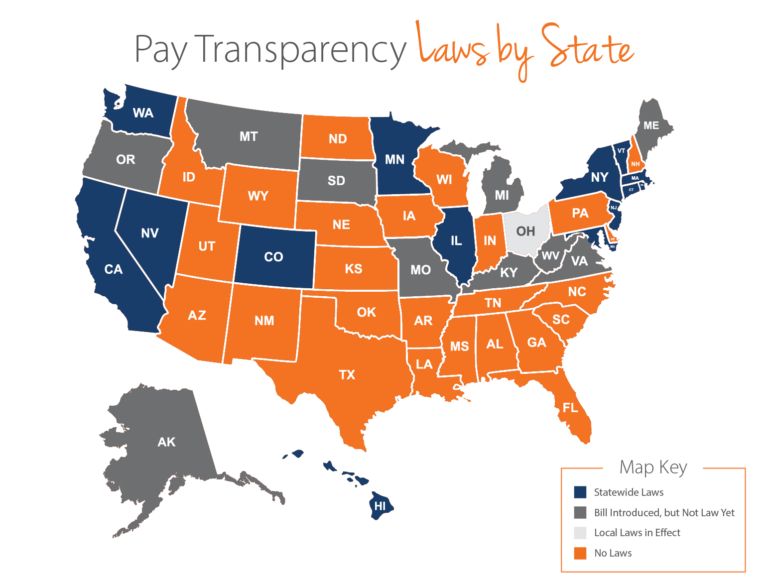As pay transparency laws continue to gain support, employers must keep up to ensure they’re in compliance. While there is currently no federal law for pay transparency, 14 states have enacted pay transparency laws. Learn what pay transparency laws require and which states have such laws on the books.
What Are Pay Transparency Laws?
Pay transparency laws are regulations that require employers to disclose salary information at various points in the employment process and allow employees to discuss salaries freely. These laws aim to level the playing field and address wage gaps based on gender, race, and other protected characteristics.
State pay transparency laws vary, but examples include:
- Requiring employers to post salary ranges in job advertisements
- Requiring employers to disclose pay scales to job candidates or current employees upon request
- Prohibiting employers from asking applicants about their salary history during the interview and hiring process
What is the Salary Transparency Act?
A Salary Transparency Act was introduced in the House in 2023. If enacted, the federal law would require employers to disclose the wage or wage range in the public or internal posting of an employment opportunity. This bill is still pending.
Pay Transparency Laws By State: Which States Have Salary Transparency Laws?

A total of 14 states and Washington D.C. have statewide pay transparency laws. The states include:
- California
- Colorado
- Connecticut
- Hawaii
- Illinois
- Maryland
- Massachusetts
- Minnesota
- Nevada
- New Jersey
- New York
- Rhode Island
- Vermont
- Washington
U.S. Pay Transparency Laws By State 2025
| State | Is There a Pay Transparency Law? | Law Details |
|---|---|---|
| Colorado | Yes — Equal Pay for Equal Work Act | Employers are prohibited from asking applicants for their wage history or retaliating against employees for discussing their pay. In addition, employers are required to disclose compensation in all job postings and notices, both internal and public. |
| Connecticut | Yes — Public Act No. 21-30 | Prohibits employers from retaliating against employees for discussing their pay. Requires employers to provide applicants with pay ranges for positions upon request. |
| District of Columbia | Yes — Wage Transparency Omnibus Amendment Act of 2023 | Employers are required to include salary range or hourly pay rate on job postings and provide healthcare benefits information before a first interview. Prohibits employees from asking prospective employees for wage history. |
| Hawaii | Yes — Act 203 | Requires employers with 50+ employees to include pay scales with job postings. |
| Illinois | Yes — Illinois House Bill 3129 | Requires employers with 15+ workers to provide a wage scale and benefits description with job postings. |
| Maryland | Yes — Equal Pay for Equal Work Act | Employer must post wage ranges in internal and public job postings, and provide ranges to applicants upon request. |
| Massachusetts | Yes — Frances Perkins Workplace Equity Act | Employers with 25+ employees must disclose the pay range for all job postings. |
| Minnesota | Yes — Statute 181.173 | Employers with 30+ employees must include a pay range in job postings along with a general description of benefits and other compensation offered. |
| Nevada | Yes — Bill 293 | Requires employers to share salary information with internal and external applicants. Prohibits employers from asking job applicants for their salary history. |
| New Jersey | Yes — Bill 2310 | Requires employers with 10+ employees to post salary range and a description of benefits and other compensation with all job postings. |
| New York | Yes — Labor Law Section 194-B | Employers with 4+ employees must disclose salary ranges for all positions and state if role is commission-based. |
| Ohio | Yes | Local law(s) in effect. |
| Rhode Island | Yes — Pay Equity Act | Employer can’t ask applicants for wage history and must supply pay range for positions upon request. Prohibits employers from retaliating against employees for discussing their pay. |
| Vermont | Yes — Act 155 | Employers with 5+ employees must disclose salary range or hourly wage in all job postings. For commissioned or tipped jobs, posting should state they are commission or tip-based. |
| Washington | Yes — Equal Pay and Opportunities Act | Requires employers with 15+ employees to include salary ranges on all job postings and disclose pay for internal transfers and promotions upon employee request. |
States Considering Pay Transparency Laws
As pay transparency gains steam, more states will propose related legislation. There are 10 states that have introduced bills regarding pay transparency but haven’t yet passed a law yet. They include:
States Without Pay Transparency Laws
There are currently 36 states without pay transparency laws. The list includes:
- Alabama
- Alaska
- Arizona
- Arkansas
- Delaware
- Florida
- Georgia
- Idaho
- Indiana
- Iowa
- Kansas
- Kentucky
- Louisiana
- Maine
- Michigan
- Mississippi
- Missouri
- Montana
- Nebraska
- New Hampshire
- New Mexico
- North Carolina
- North Dakota
- Ohio (local laws only)
- Oklahoma
- Oregon
- Pennsylvania
- South Carolina
- South Dakota
- Tennessee
- Texas
- Utah
- Virginia
- West Virginia
- Wisconsin
- Wyoming
How Paycor Helps
From recruitment to onboarding and compensation, employers need to be organized and compliant. Paycor’s HCM software is backed by compliance expertise to help ensure your HR and payroll practices evolve with changing regulation. With compliance solutions for every aspect of HR, we empower 30,000+ organizations to remain informed and compliant. Take a guided tour to learn more.









